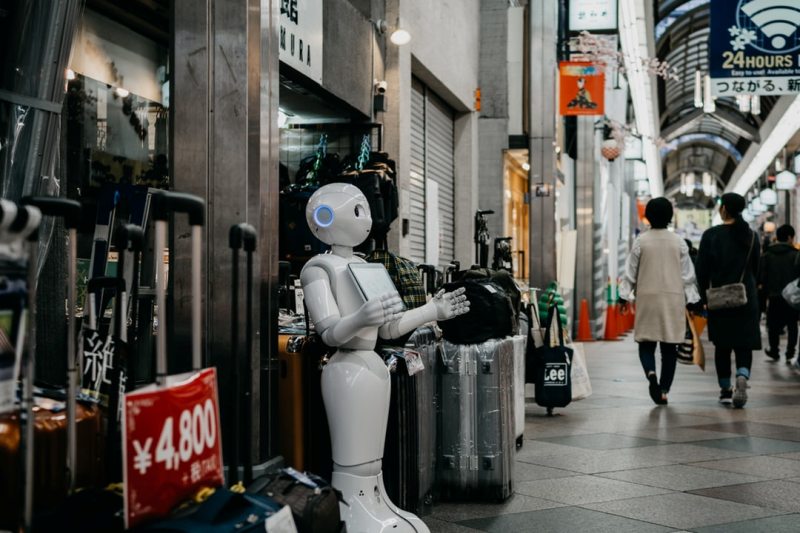
We humans seem to have a really strange relationship with work. It’s often relegated to a necessary evil in our lives: things like TGIF (thank God it’s Friday), or the old clothing label WFTW (working for the weekend) kind of give that away. It is almost strange to have someone confess that “I love my job”.
You might think that our aim in life is to avoid work at any cost so we can enjoy ourselves. So why the panic when it is suggested that soon robots will be doing all our work? Yet it is our work that provides us with the wherewithal to enjoy the weekend!
The nature of work
The first instruction God gave Adam was to work by tending the Garden of Eden (Genesis 2:15). Wow – who wouldn’t want to do that! I mean, this was in the time before the fall when there were no weeds, mosquitoes or deadly snakes.
Then there are different kinds of work. For example, Exodus 28 describes the work of an embroiderer, people having skilled hands, a perfumer, artistic work in silver, gold, bronze and wood, construction, weaving and garment making, and agriculture. Not only are these things designed to keep you off the streets, but to create things of beauty and to be healthy through the activity.
God has also gifted people with different skills and abilities and it is obvious that people would be happiest in their job if they were doing something, for which they are gifted. There is a purpose for the gifting – self fulfillment is one, but also service to the community comes into it. And it is a means of having enough money to live on.
After all, we are created in God’s image, and God himself works! I don’t believe that God means us to kick against unsatisfying and boring work. (I’m not sure that he invented the Public Service – the thought was good, but it seems to have become corrupted from the original intention!).
But so many of us seem to be stuck working in something that we don’t enjoy.
Enter the robot
So how do we overcome the issue of boring, routine, dirty, unstimulating work that still needs to be done? Automation is one of the answers.
Robots are used in many areas now, with research being carried out to expand their use worldwide. Robots don’t get tired or sick, they can be set to work 24/7 and in some cases they can be programmed to be far more precise than the human hand can be.
Some such areas are driverless cars, robotic surgery and probably the area we are more familiar with – industrial robots. That link provides a good discussion of pros and cons of robot use.
Isaac Asimov, the greatest science fiction writer of all time, (I am biased), envisaged a society where robots were taken for granted and carried out menial as well as some higher order tasks. He formulated the three Laws of Robotics, which sought to protect humans in the first instance:
- A robot may not injure a human being, or, through inaction, allow a human being to come to harm.
- A robot must obey the orders given it by human beings except where such orders would conflict with the First Law.
- A robot must protect its own existence as long as such protection does not conflict with the First or Second Law.
The underlying assumption was that robots are a part of society, but there need to be constraints that prevent them from ‘having a mind of their own’ which could ultimately jeopardize human life. In other words, there should be a boundary to Artificial Intelligence.
Are jobs in jeopardy?
Automation changes a society’s dynamics. Already we don’t have school kids earning pocket money on the milk run. A factory may let go a number of low paid workers in favour of an automated production line.
In fact some recent Catalyst programs showed how artificial intelligence can be used to teach students. There are extensions of that idea with robots in some classrooms for students with special needs, who have relational difficulties.
But what can we do to ensure that everyone has a useful, fulfilling job that brings in a wage and contributes to that society? This is becoming a genuine concern, not only for high school and university graduates, but also for older people who want to enter, or remain in, the workforce.
The human touch
As much as they are lauded, automation and artificial intelligence have considerable drawbacks. They lack uniquely human skills – design, leadership, caring – human things that robots can’t do.
Chris Richardson, from Deloitte Access Economics, gave the Press Club address on 12 June 2019. He stressed the significance of the human touch – jobs of the heart – that cannot be replicated by automation or artificial intelligence. The future of work is human, not robotic! He tells us how human skills are hugely under supplied and as a result – skills, rather than occupations or qualifications – are the job currency of the future.
He might have been reading the Bible to come to the conclusion that what is needed are jobs of the heart – childcare, aged care, true nursing with patients and suchlike. Humans need humans. That’s how we are created. Some things just cannot be automated, and we need wisdom to use automation well.
 Aira Chilcott is a retired secondary school teacher with lots of science and theology under her belt. Aira is a panellist for Young Writers and indulges in reading, bushwalking, volunteering at a nature reserve and learning to play clarinet. Aira is married to Bill and they have three adult sons.
Aira Chilcott is a retired secondary school teacher with lots of science and theology under her belt. Aira is a panellist for Young Writers and indulges in reading, bushwalking, volunteering at a nature reserve and learning to play clarinet. Aira is married to Bill and they have three adult sons.
Aira Chilcott's previous articles may be viewed at http://www.pressserviceinternational.org/aira-chilcott.html

Aira Chilcott is a retired secondary school teacher with lots of science andtheology under her belt. Aira is an editor for PSI and indulges inreading, bushwalking and volunteering at a nature reserve. Aira’s husband Bill passed away in 2022 and she is left with three wonderful adult sons and one grandson.
Aira Chilcott's previous articles may be viewed at http://www.pressserviceinternational.org/aira-chilcott.html